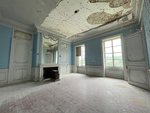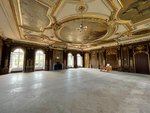A scrappy group of young preservationists has reached an agreement to buy and start restoring Lynnewood Hall, the 110-room Gilded Age mansion in Elkins Park.
This item is available in full to subscribers.
We have recently launched a new and improved website. To continue reading, you will need to either log into your subscriber account, or purchase a new subscription.
If you are a digital subscriber with an active subscription, then you already have an account here. Just reset your password if you've not yet logged in to your account on this new site.
If you are a current print subscriber, you can set up a free website account by clicking here.
Otherwise, click here to view your options for subscribing.
Please log in to continue |


A scrappy group of young preservationists has reached an agreement to buy and start restoring Lynnewood Hall, the 110-room Gilded Age mansion in Elkins Park that has been vacant and deteriorating for more than 30 years.
The visionary behind this effort is Edward Thome, a 24-year-old man from Central Pennsylvania who has been dreaming about the building since he was 11 years old and first came across pictures of it on the internet. He and his friend and partner Angie Van Scyoc, who created the Lynnewood Hall Preservation Foundation in 2019, have been steadily working toward that goal ever since.
But it wasn’t until last summer that their plans really took off. That’s when Chestnut Hill resident George Coates, a former entrepreneur turned business and public policy consultant, joined their foundation's board and helped them get their nonprofit status. Then shortly after that they met a pair of angel investors: Scott and Susan Bentley of Pottstown. Scott Bentley was a founding partner of Bentley Systems, one of the largest software and systems engineering companies in the world, and is the current CEO of VideoRay, which builds and operates robotic underwater survey machines.
“We went public with our website on July 5th, and the following weekend we got our notice from the IRS telling us that our 501c3 had been approved as of June 28,” Van Scyoc said. “Then it just so happened, we had an event that weekend where one of our board members had invited a mentor who happened to know an investor who he said might be interested – which turned out to be Scott and Susan Bentley.”
Less than a week later they had the funding they needed to begin serious negotiations to buy the property. Yet again, Coates stepped in to help. He took the lead on negotiating the purchase agreement, which he said they settled on late last year. He expects the deal to close sometime this spring, he said, noting that he cannot disclose the sale price until then.
“It all came together in the space of about five weeks,” Thome said. “After working with George for about a year, he joined the board in June, then we met Scott and Susan, by the second week of July we were up and running.”
“Most people we talked to were so dismissive of us – this project has always been one that so many people have attempted and failed,” Van Scyoc said. “George was different. He saw the vision, saw our dedication and commitment and respected it.”
Coates, meanwhile, said he got on board because he thought both Thome and Van Scyoc have what it takes to tackle such an enormous project.
“I love it when I come across people who are so completely committed to what they do. I find that exciting, whenever I bump into it, and both of them have that spirit,” Coates said. “And of course it must be said that we would absolutely not be bringing this to where we are now without the incredible support of both Scott and Susan.”
A historic saga
Altogether, the estate includes three buildings. Lynnewood Hall itself is 100,000 square feet, Lynnewood Lodge, which originally housed a carriage house and stables, is 16,000 square feet. There is also a 5,000 square foot gatehouse.
Originally constructed as part home and part art gallery, the opulent Hall included every available luxury of its day – alabaster sinks, doors of solid Florentine bronze, moldings gilded with actual gold and carved black walnut doors imported from London. Built in 1899 by Philadelphia industrialist Peter A. B. Widener, it was designed by famed architect Horace Trumbauer, part of a team that designed the Philadelphia Museum of Art.
The Widener family lived in the house until 1944, when they sold it to the Rev. Carl McIntire, founder of the Faith Theological Seminary, for $190,000. McIntire used the building for his school for about four decades, during which time he sold off many of the estate’s architectural assets – including its one-of-a-kind fountain. Eventually it fell into such disrepair that the slate roof collapsed.
Dr. Richard Yoon of the Korean Presbyterian Church of New York, the current owner and a former student at the seminary, was a lienholder on the property when he assumed ownership in late 1996.
The idea
Once they finalize the purchase, the group plans to focus first on restoring the 34-acre grounds in the hopes that they will become a public amenity for Cheltenham Township.
“We want to return this property to being a living, breathing part of Cheltenham Township as soon as we possibly can,” Van Scyoc said.
“The gardens are a particularly high priority for our benefactors,” Coates said. “The property had about the finest formal French gardens in the country at the turn of the last century, if not in the world. It was really like a mini-Versailles.”
That restoration won’t replicate the original exactly, partly because changing climate conditions mean that some of what was originally planted may no longer thrive there, Coates said, and also because it took “something like 60 or 70 full time gardeners” to tend them.
“But we know what the footprint was and we have all the original layouts,” Coates said.
Our hope is that eventually, the grounds will be open to the public, as a park, and that formal part of the garden will be something that there will be a fee to tour, much like Longwood Gardens, or Chanticleer.”
Next, they intend to turn their attention to the Hall itself.
As their agreement allows them access to the building for basic maintenance, they’ve already replaced 65 of the Hall’s 220 windows, and are currently fixing some drainage problems.
“We’ve been working to get the building watertight – fixing the roof, working on the windows and dealing with some drainage issues,” Thome said. “Now that we have put up some video surveillance, which we needed to do to make sure there’s no more vandalism, our biggest challenge right now is keeping the water out.”
Full restoration will take an enormous amount of time and money as well as skill and effort, so the group is planning for a long term project that will incorporate an education program for historic restoration into the process, using the work as a kind of educational laboratory.
“Education, sustainability, and art preservation are integral components of this multi-phased restoration project,” they write in their mission statement. “Moreover, the project will offer the greater community access to aspirational jobs and educational opportunities in history, artisan restoration arts, sustainability, horticulture, design, music, culinary arts, and skilled trades.”
This is not the first piece of recent good news for historic preservation in Elkins Park. Just around the corner from Lynnewood Hall, the Elkins Estate’s 70,000- square-foot Elstowe Manor – another Gilded Age mansion – was purchased last year by developers who plan to reopen it as a boutique hotel and event venue this spring. The plans are part of a $25 million multi-phase redevelopment of the 124-year-old, 42-acre property, which the Dominican Sisters of St. Catherine de Ricci sold to New Jersey-based Landmark Developers in 2019 for $6.5 million.
Thome and Van Scyoc say they expect their project to complement that facility, not compete with it.
“They are doing an amazing job over there and we very much intend to work in tandem with them,” Thome said. “We see our project as being complementary to theirs.”